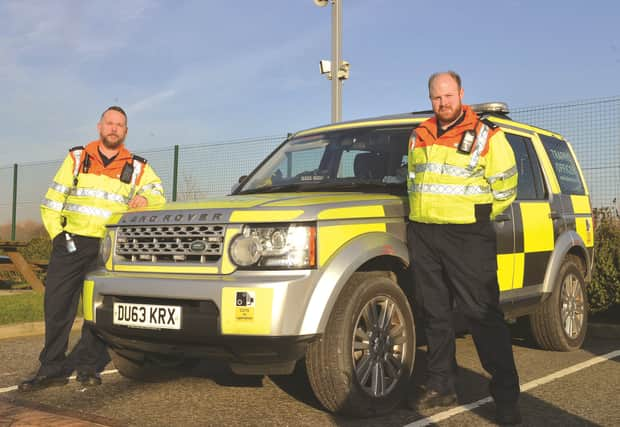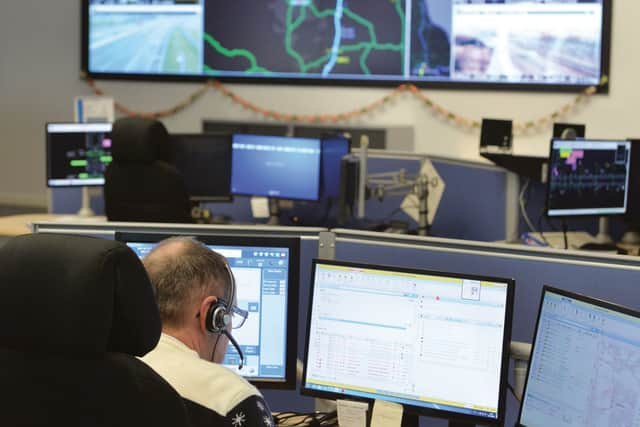Meet the team keeping the roads safe this Christmas


It's Christmas Jumper Day at Highways England’s regional control centre.
There are paper chains and a Christmas tree and a man has just walked past in a novelty suit and comedy elf hat.
Advertisement
Hide AdAdvertisement
Hide AdJust a stone’s throw away, the mood on the M1 is decidedly less festive.
It is ironic that my arrival at the transport hub tasked with keeping the roads flowing freely is delayed by 40 minutes due to a massive queue caused by a van fire.
But I can at least watch on a big TV screen as the congestion finally begins to ease.


The team at the control centre — located at junction 39 just outside Wakefield and known as the RCC — has the job of overseeing the network between Chesterfield and Newcastle, including parts of the A1, M1, M62 and M18.
Advertisement
Hide AdAdvertisement
Hide AdThey close lanes, alter speed limits, communicate with police and traffic officers out on the roads, talk to motorists calling from emergency phones, manage traffic flows, issue traffic updates on social media and co-ordinate the response to everything from accidents and fires to animals in the road.
There’s a silver command centre for major incidents but the day-to-day business takes place in the control room itself, where banks of desks are arranged to face 16 TV screens showing live pictures from more than 50 overhead cameras stationed up and down the motorways, weather updates and rolling news coverage.
Starting off by showing me the crawling queue I’ve just escaped from, operations manager Chris Addy demonstrates how staff control the cameras to swing round and zoom in on stopped vehicles and incidents, such as a queue crawling at that point past the Catcliffe junction due to a broken-down lorry.
The Yorkshire network includes long stretches of “smart” motorway.
Advertisement
Hide AdAdvertisement
Hide AdIntroduced to increase capacity and ease congestion, these new kids on the motorway block are not without their critics, mainly because of the absence of a hard shoulder.
A woman died earlier this year near Woodall services after leaving her broken-down car and being hit in the inside lane, while an Advertiser reader recently reported seeing vehicles careering towards another van stopped at the roadside near Aston.
Chris insists the “smart” technology involved makes the roads safer.
“Having a hard shoulder often creates an incentive to stop,” he explains.
Advertisement
Hide AdAdvertisement
Hide Ad“It’s very rare for vehicles to stop suddenly but we have a system called MIDAS, an automated system using sensors below the surface, which pick up when traffic flows are unusual and can alter the overhead signs to issue warnings and reduce speed limits.
“We get an alert from that and can move to close lanes.
“Our objective is to avoid disruption and when you see a speed reduction that will help to keep the traffic flowing.”
Despite the Christmas spirit on show, managing the roads is a serious business.
While officers on the scene bear the brunt, operators in the control centre can find themselves talking to distressed motorists and passengers or co-ordinating the response to incidents were someone has died, which can take its toll.
Advertisement
Hide AdAdvertisement
Hide AdTeam manager Andy Whittaker was on shift at the time of the minibus crash on the M62 in 2013 where eight members of a hen party were seriously hurt.
He said adrenaline had kicked in and the need to respond to the incident professionally saw him through but the day had come back to him whenever it was in the news again.
Chris says there are support networks in place for staff and trauma therapy is available.
As for this Christmas, the last day of term today is expected be a hectic one, while Christmas Day itself is a quiet one — thanks in part to the removal of all roadworks.
Advertisement
Hide AdAdvertisement
Hide AdBut there will still be a team on duty monitoring the “eyes in the sky”.
And as more cars come onto the road, their role remains as vital as ever.
“Whenever you increase capacity and put in an extra lane, it always get filled,” Chris says.
“We’re not the busiest region but we’re certainly not the quietest either and we cover a large area, and all the signs are traffic levels are increasing.”